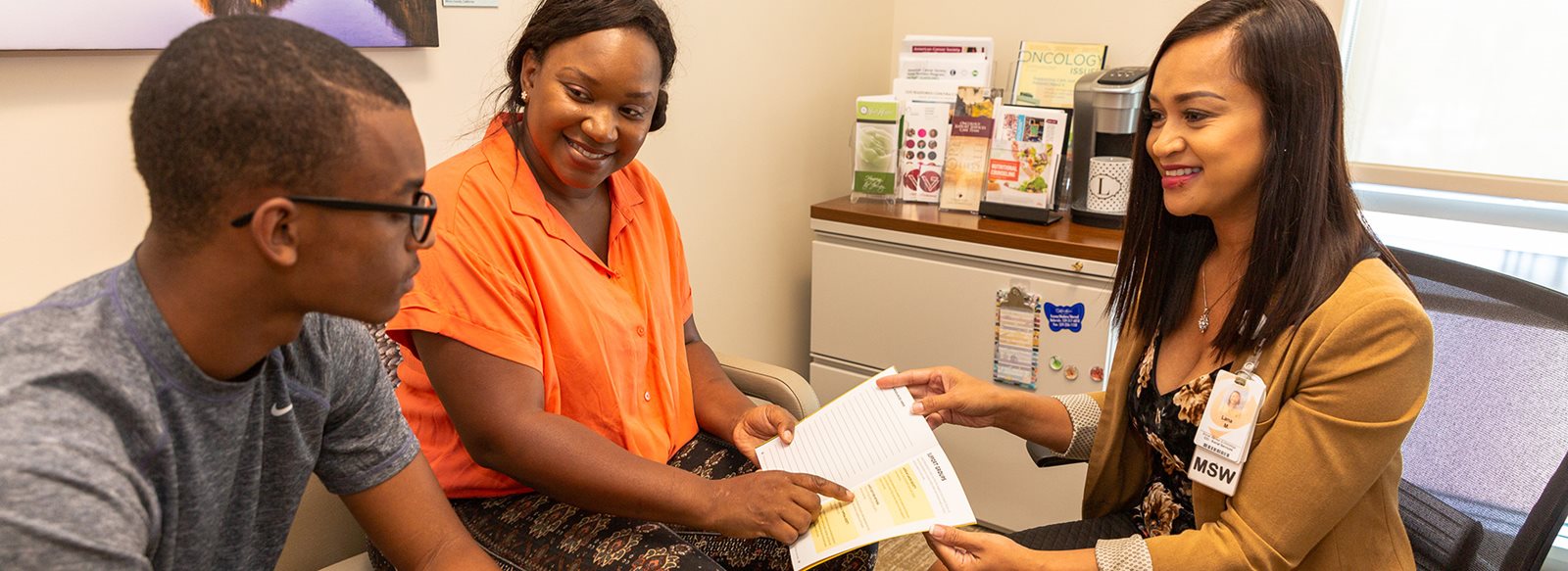
Your Journey Begins Here
A cancer diagnosis can bring fear, confusion and a whole lot of questions. Over the next few weeks you’ll be given and asked for a lot of information. But rest assured … we’ll be right beside you every step of the way.
1. Register for MyChart
MyChart is an online, interactive medical portal providing a free, easy and secure way to access your personal health information. With MyChart, you can communicate with your doctor, view test results, request prescription refills, manage appointments and more.If you don’t have a MyChart account yet, simply visit mychart.communitymedical.org, click “I need a code” and complete the form.
2. Review and Complete Pre-Visit Forms
To help us design the best treatment plan for you, please download and complete the forms below. Then bring them with you to your first appointment.Patient Self-Assessment
Dietary Questionnaire
3. Take a Tour
Are you being treated at Community Cancer Institute? Community Cancer Institute is Central California’s only comprehensive care center with everything all under one roof. Before your visit, take a virtual tour to learn where things are located ahead of time and our technology and services.Begin Tour
1. About Cancer
Normal cells vs. cancer cells
The cells in our bodies all have certain jobs to do. Normal cells divide in an orderly way and when they are worn out or damaged, new cells are generated to take their place.
Cancer is when cells grow out of control, and crowd out normal cells. Most cancers form a lump called a tumor. If a tumor is cancerous, it's called malignant. If a tumor is not cancerous, it's called benign. Cancer cells can spread from other parts of the body. When cancer spreads, it’s called metastasis.
Staging
In addition to identifying the type of cancer, your oncologist also needs to know if and how far the cancer has spread. This is known as the cancer stage. Not all cancers are staged. Early or localized cancers are usually Stage 1 or 2. More advanced cancers are Stage 3 or 4. Knowing the stage of cancer helps the doctor decide what type of treatment is best for you.
Treatment options
The most common treatments for cancer are surgery, chemotherapy, immunotherapy, and radiation. Depending on your cancer type, staging and location, a patient may have one or a combination of treatments.
-
Surgery can be used to remove the cancer. The surgical oncologist may also remove some or all of the organ the cancer affects.
-
Chemotherapy uses medications to attack cancer cells throughout the body.
-
Immunotherapy/Targeted Therapy are medications used to attack cancer cells throughout the body.
-
Radiation Therapy uses strong beams of energy to target and kill cancer cells while shielding as many of the normal cells as possible. We’ve made significant investments in world-class radiation detection and delivery systems to speed treatment and improve your recovery.
2. Oncology Support Services
We believe cancer care takes more than just great medicine. That’s why we have a support team for both you and your family members. We cover everything from coordinating your care and financial counseling to rehabilitation services, social work and much more.
Learn more about oncology support services.
3. Support Groups
Talking with others who have been through cancer can make huge difference in your quality of life. Be sure to take advantage of the many support groups we offer.
Support groups
4. Genetic Testing & Counseling Might Offer Clues
If you or a family member has been diagnosed with cancer, evaluating your genetic makeup can provide valuable information to help you and your doctors make more informed decisions about your care — now and in the future.
See if genetic counseling is right for you.
5. We Offer Clinical Trials
In collaboration with UCSF Fresno, we have brought cutting-edge clinical trials to the Central Valley — ensuring you do not have to travel to San Francisco, Los Angeles or anywhere else to access new treatment protocols before they’re available to the public.
6. Contact Information
Cancer Services
Community Cancer Institute
785 North Medical Center Drive West
Clovis, CA 93611
(559) 387-1600
Clovis Community Medical Center
2755 Herndon Avenue
Clovis, CA 93611
(559) 324-4000
Community Regional Medical Center
2823 Fresno Street
Fresno, CA 93721
(559) 459-6000
Hours
7 a.m.-6 p.m. Monday - Friday
Lab Hours:
7:30 a.m.-5:30 p.m. Monday - Friday
Valet Hours: *Valet services currently suspended due to COVID-19*
7:30 a.m.-6 p.m. Monday - Friday
We use cookies and other tools to optimize and enhance your experience on our website. View our Privacy Policy.

